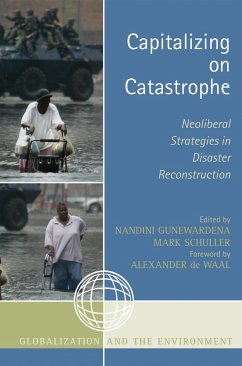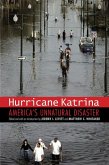Capitalizing on Catastrophe
Neoliberal Strategies in Disaster Reconstruction
Herausgeber: Gunewardena, Nandini; Schuller, Mark
Capitalizing on Catastrophe
Neoliberal Strategies in Disaster Reconstruction
Herausgeber: Gunewardena, Nandini; Schuller, Mark
- Gebundenes Buch
- Merkliste
- Auf die Merkliste
- Bewerten Bewerten
- Teilen
- Produkt teilen
- Produkterinnerung
- Produkterinnerung
Capitalizing on Catastrophe critically explores the phenomenon of 'disaster capitalism, ' in which relief efforts for natural disasters and other large-scale disruptions are contracted out to private companies
Andere Kunden interessierten sich auch für
![Governing Affect Governing Affect]() Roberto E BarriosGoverning Affect61,99 €
Roberto E BarriosGoverning Affect61,99 €![Living on Living on]() Christopher T DoleLiving on128,99 €
Christopher T DoleLiving on128,99 €![Atmospheric Violence Atmospheric Violence]() Omer AijaziAtmospheric Violence109,99 €
Omer AijaziAtmospheric Violence109,99 €![Hurricane Katrina Hurricane Katrina]() Hurricane Katrina47,99 €
Hurricane Katrina47,99 €![Ethnoarchaeology of Shuwa-Arab Settlements Ethnoarchaeology of Shuwa-Arab Settlements]() Augustin F. C. HollEthnoarchaeology of Shuwa-Arab Settlements139,99 €
Augustin F. C. HollEthnoarchaeology of Shuwa-Arab Settlements139,99 €![Basic Dimensions in Conscious Thought Basic Dimensions in Conscious Thought]() George A. de VosBasic Dimensions in Conscious Thought192,99 €
George A. de VosBasic Dimensions in Conscious Thought192,99 €![Language, Culture, and Communication Language, Culture, and Communication]() Nancy BonvillainLanguage, Culture, and Communication152,99 €
Nancy BonvillainLanguage, Culture, and Communication152,99 €-
-
-
Capitalizing on Catastrophe critically explores the phenomenon of 'disaster capitalism, ' in which relief efforts for natural disasters and other large-scale disruptions are contracted out to private companies
Produktdetails
- Produktdetails
- Altamira Press
- Verlag: Globe Pequot Publishing Group Inc
- Seitenzahl: 288
- Erscheinungstermin: 25. Februar 2008
- Englisch
- Abmessung: 239mm x 161mm x 15mm
- Gewicht: 590g
- ISBN-13: 9780759111028
- ISBN-10: 0759111022
- Artikelnr.: 23305227
- Herstellerkennzeichnung
- Libri GmbH
- Europaallee 1
- 36244 Bad Hersfeld
- gpsr@libri.de
- Altamira Press
- Verlag: Globe Pequot Publishing Group Inc
- Seitenzahl: 288
- Erscheinungstermin: 25. Februar 2008
- Englisch
- Abmessung: 239mm x 161mm x 15mm
- Gewicht: 590g
- ISBN-13: 9780759111028
- ISBN-10: 0759111022
- Artikelnr.: 23305227
- Herstellerkennzeichnung
- Libri GmbH
- Europaallee 1
- 36244 Bad Hersfeld
- gpsr@libri.de
Nandini Gunewardena is adjunct professor at Western Washington University. Mark Schuller is assistant professor of anthropology and African American studies at the City University of New York.
Part 1 Part I. Framing the Capitalization of Catastrophes
Chapter 2 Chapter 1. Human Security versus Neoliberal Approaches to
Disaster Recovery
Chapter 3 Chapter 2. Deconstructing the Disaster after the Disaster:
Conceptualizing Disaster Capitalism
Chapter 4 Chapter 3. Through a Glass, Darkly: Humanitarianism and Empire
Part 5 Part II. Tourism as Reconstruction
Chapter 6 Chapter 4. International Tourism and Disaster Capitalism: The
Case of Hurricane Mitch in Honduras
Chapter 7 Chapter 5. Peddling Paradise, Rebuilding Serendib: The 100-Meter
Refugees versus the Tourism Industry in Post-tsunami Sri Lanka
Chapter 8 Chapter 6. The Resilience of Vulnerable Households: Adjusting to
Neoliberal Capitalism in the Aftermath of Hurricane Iris
Part 9 Part III. Exposing Katrina: Class, Race, and Displacement
Chapter 10 Chapter 7. Race, Class, and the Politics of Death: Critical
Responses to Hurricane Katrina
Chapter 11 Chapter 8. Disaster, Displacement and Employment: Distortion of
Labor Markets During Post-Katrina Reconstruction
Chapter 12 Chapter 9. Class Inequality, Liberal Bad Faith, and
Neoliberalism: the True Disaster of Katrina
Part 13 Part IV. Prolonging Recovery: Bypassing Accountability and
Transparency
Chapter 14 Chapter 10. Capitalization of Post-9/11 Recovery
Chapter 15 Chapter 11. The Foul Odor of Capital: The Union Carbide Disaster
in Bhopal, India
Part 16 Part V. Dividends of Conflict: Reconstruction as Reform
Chapter 17 Chapter 12. "Haiti is Finished!" Haiti's End of History Meets
the Ends of Capitalism
Chapter 18 Chapter 13. After the Storm: The Aftermath of Guatemala's
Post-Civil War
Part 19 Part VI. Conclusion: Envisioning Alternatives: Seven Pragmatic
Proposals to Advance Human Security in Disaster Assistance and Recovery
Chapter 2 Chapter 1. Human Security versus Neoliberal Approaches to
Disaster Recovery
Chapter 3 Chapter 2. Deconstructing the Disaster after the Disaster:
Conceptualizing Disaster Capitalism
Chapter 4 Chapter 3. Through a Glass, Darkly: Humanitarianism and Empire
Part 5 Part II. Tourism as Reconstruction
Chapter 6 Chapter 4. International Tourism and Disaster Capitalism: The
Case of Hurricane Mitch in Honduras
Chapter 7 Chapter 5. Peddling Paradise, Rebuilding Serendib: The 100-Meter
Refugees versus the Tourism Industry in Post-tsunami Sri Lanka
Chapter 8 Chapter 6. The Resilience of Vulnerable Households: Adjusting to
Neoliberal Capitalism in the Aftermath of Hurricane Iris
Part 9 Part III. Exposing Katrina: Class, Race, and Displacement
Chapter 10 Chapter 7. Race, Class, and the Politics of Death: Critical
Responses to Hurricane Katrina
Chapter 11 Chapter 8. Disaster, Displacement and Employment: Distortion of
Labor Markets During Post-Katrina Reconstruction
Chapter 12 Chapter 9. Class Inequality, Liberal Bad Faith, and
Neoliberalism: the True Disaster of Katrina
Part 13 Part IV. Prolonging Recovery: Bypassing Accountability and
Transparency
Chapter 14 Chapter 10. Capitalization of Post-9/11 Recovery
Chapter 15 Chapter 11. The Foul Odor of Capital: The Union Carbide Disaster
in Bhopal, India
Part 16 Part V. Dividends of Conflict: Reconstruction as Reform
Chapter 17 Chapter 12. "Haiti is Finished!" Haiti's End of History Meets
the Ends of Capitalism
Chapter 18 Chapter 13. After the Storm: The Aftermath of Guatemala's
Post-Civil War
Part 19 Part VI. Conclusion: Envisioning Alternatives: Seven Pragmatic
Proposals to Advance Human Security in Disaster Assistance and Recovery
Part 1 Part I. Framing the Capitalization of Catastrophes
Chapter 2 Chapter 1. Human Security versus Neoliberal Approaches to
Disaster Recovery
Chapter 3 Chapter 2. Deconstructing the Disaster after the Disaster:
Conceptualizing Disaster Capitalism
Chapter 4 Chapter 3. Through a Glass, Darkly: Humanitarianism and Empire
Part 5 Part II. Tourism as Reconstruction
Chapter 6 Chapter 4. International Tourism and Disaster Capitalism: The
Case of Hurricane Mitch in Honduras
Chapter 7 Chapter 5. Peddling Paradise, Rebuilding Serendib: The 100-Meter
Refugees versus the Tourism Industry in Post-tsunami Sri Lanka
Chapter 8 Chapter 6. The Resilience of Vulnerable Households: Adjusting to
Neoliberal Capitalism in the Aftermath of Hurricane Iris
Part 9 Part III. Exposing Katrina: Class, Race, and Displacement
Chapter 10 Chapter 7. Race, Class, and the Politics of Death: Critical
Responses to Hurricane Katrina
Chapter 11 Chapter 8. Disaster, Displacement and Employment: Distortion of
Labor Markets During Post-Katrina Reconstruction
Chapter 12 Chapter 9. Class Inequality, Liberal Bad Faith, and
Neoliberalism: the True Disaster of Katrina
Part 13 Part IV. Prolonging Recovery: Bypassing Accountability and
Transparency
Chapter 14 Chapter 10. Capitalization of Post-9/11 Recovery
Chapter 15 Chapter 11. The Foul Odor of Capital: The Union Carbide Disaster
in Bhopal, India
Part 16 Part V. Dividends of Conflict: Reconstruction as Reform
Chapter 17 Chapter 12. "Haiti is Finished!" Haiti's End of History Meets
the Ends of Capitalism
Chapter 18 Chapter 13. After the Storm: The Aftermath of Guatemala's
Post-Civil War
Part 19 Part VI. Conclusion: Envisioning Alternatives: Seven Pragmatic
Proposals to Advance Human Security in Disaster Assistance and Recovery
Chapter 2 Chapter 1. Human Security versus Neoliberal Approaches to
Disaster Recovery
Chapter 3 Chapter 2. Deconstructing the Disaster after the Disaster:
Conceptualizing Disaster Capitalism
Chapter 4 Chapter 3. Through a Glass, Darkly: Humanitarianism and Empire
Part 5 Part II. Tourism as Reconstruction
Chapter 6 Chapter 4. International Tourism and Disaster Capitalism: The
Case of Hurricane Mitch in Honduras
Chapter 7 Chapter 5. Peddling Paradise, Rebuilding Serendib: The 100-Meter
Refugees versus the Tourism Industry in Post-tsunami Sri Lanka
Chapter 8 Chapter 6. The Resilience of Vulnerable Households: Adjusting to
Neoliberal Capitalism in the Aftermath of Hurricane Iris
Part 9 Part III. Exposing Katrina: Class, Race, and Displacement
Chapter 10 Chapter 7. Race, Class, and the Politics of Death: Critical
Responses to Hurricane Katrina
Chapter 11 Chapter 8. Disaster, Displacement and Employment: Distortion of
Labor Markets During Post-Katrina Reconstruction
Chapter 12 Chapter 9. Class Inequality, Liberal Bad Faith, and
Neoliberalism: the True Disaster of Katrina
Part 13 Part IV. Prolonging Recovery: Bypassing Accountability and
Transparency
Chapter 14 Chapter 10. Capitalization of Post-9/11 Recovery
Chapter 15 Chapter 11. The Foul Odor of Capital: The Union Carbide Disaster
in Bhopal, India
Part 16 Part V. Dividends of Conflict: Reconstruction as Reform
Chapter 17 Chapter 12. "Haiti is Finished!" Haiti's End of History Meets
the Ends of Capitalism
Chapter 18 Chapter 13. After the Storm: The Aftermath of Guatemala's
Post-Civil War
Part 19 Part VI. Conclusion: Envisioning Alternatives: Seven Pragmatic
Proposals to Advance Human Security in Disaster Assistance and Recovery








